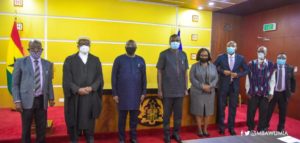Taskforce for National ECOWAS Early Warning Centre inaugurated
 A 10-member Taskforce has been inaugurated by the Vice President to work towards establishing a National ECOWAS Early Warning Centre by July, this year.
A 10-member Taskforce has been inaugurated by the Vice President to work towards establishing a National ECOWAS Early Warning Centre by July, this year.
Members of the Taskforce, chaired by Professor Joe Amoako-Tuffour of the Office of the Vice President, are drawn from ministries of Foreign Affairs and Regional Integration, Finance, Health, Defence, Interior, Justice, National Security and Environment, Science, Innovation and Technology.
The establishment of the Centre is aimed at helping to guarantee security and provide timely reports and analysis to ECOWAS Member States for effective responses to prevent and mitigate violent conflicts, wanton health crises, environmental disasters, among others.
Vice President Bawumia asked the members to be diligent in the discharge of their mandate, pointing out that an efficient and effective early warning and response mechanism would not only guarantee the needed security for the country’s development, but help prevent wanton loss of lives, health crises, humanitarian disasters and environmental calamities.
He added that the government was keen on ensuring that the country established the Centre.
For some time now, ECOWAS Member States and the ECOWAS Commission have been considering effective early warning and response mechanisms in the sub-region to avert destructive crises.
Setting up National Early Warning Centres received the backing of the ECOWAS Heads of State and Government during its 45th Ordinary Session held in Accra on July 14, 2014.
Consequently, the ECOWAS Commission established National Centres for the Coordination of the Response Mechanism (NCCRM) in five pilot countries including Burkina Faso, Cote d’Ivoire, Guinea Bissau, Mali and Liberia between 2015 and 2019.
The next phase of the Project, covers Ghana, Benin, Senegal, Niger and Cape Verde.
The Vice President of the Commission, Madam Finda Koroma, met with Ghanaian government officials and institutions to deliberate on modalities for establishing the Centre in March, this year.
With these Centres, ECOWAS Member States would be able to share information, implement conflict prevention, and manage crises, while protecting human security at national and regional levels.
Vice President Bawumia said a number of activities were supposed to be undertaken by the government to meet the July deadline.
He underlined the need to speed up efforts at the “assessment of readiness” and the eventual launch of the Centre in July.
The ECOWAS Commission would provide support and logistics towards the operationalisation of the Centre.
Source: GNA
